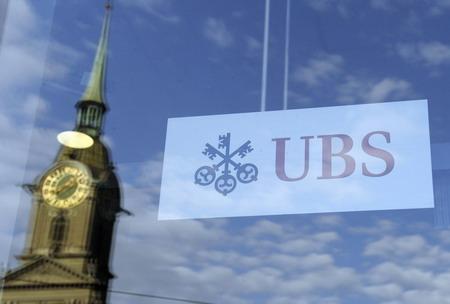
A UBS AG sign hangs inside one of the company's offices in Bern, Switzerland. Qualified Foreign Institutional Investors in China are said to be keen on trading stock index futures to benefit their Chinese A-share investments. [Agencies]
QFII participation in margin trading, short selling still unclear
UBS AG, which holds the largest investment quota of $800 million under the Qualified Foreign Institutional Investor (QFII) system in China, said yesterday it would trade China's new stock index futures.
"Regulations have made it clear that QFIIs will be allowed to take part in index futures by putting up a certain portion of their QFII quota and we hope to participate in the new financial tool to manage risks," said Nicole Yuen, head of China Equities at Switzerland-based UBS in Shanghai.
The China Securities Regulatory Commission (CSRC) approved trade in stock index futures - which may take three months to set up - in an aim to broaden investment options on the world's second-largest equities market by market value.
But the regulator didn't release details on who will be allowed to trade the new products.
The government also approved margin trading and short selling the same day, as investors seek to profit from declines in shares.
"I suspect it will probably be a little while before QFIIs can do so as detailed rules haven't yet come out for them," said Hubert Tse, managing director of international business at Yuan Tai, a Shanghai law firm.
"Chinese securities firms are expected to get the go-ahead first before QFIIs," he said.
As part of a pilot program, large securities houses like CITIC Securities, Haitong Securities and Guotai Junan Securities are likely to become the first firms to trade stock index futures, according to China Business News reports.
Tse pointed out that QFIIs are keen on trading stock index futures in the near future to benefit their Chinese A-share investments.
In 2009, the State Administration of Foreign Exchange granted $3.3 billion in quotas under the QFII program, which is the only channel for overseas investors to invest in yuan-denominated shares.
"The timing is right for opening up trade in stock index futures, especially given the relatively reasonable valuations of A-shares," Yuen said, adding that index futures may help ease market fluctuations.
The benchmark index jumped almost 80 percent in 2009 after slumping 65 percent a year earlier. To date, Chinese investors - 85 percent of which are individual investors - may only profit from gains in equities.
But Yuen said it remains to be seen whether QFIIs will be allowed to participate in margin trading and short selling.
Ni Junji, a partner at Grandall Legal Group, said it will be difficult for QFIIs to do margin trading given the quota limits imposed on them.
She added that large-caps with sound fundamentals and rosy earnings reports are likely to have more market growth potential after the new financial derivatives come out.
The China Financial Futures Exchange (CFFE), the mechanism on which stock-index futures will be traded, published rules effective in June 2007, saying that investors would be required to put up 10 percent of a contract's value to buy, sell or short sell futures based on the CSI 300, which is a capitalization-weighted stock market index.





